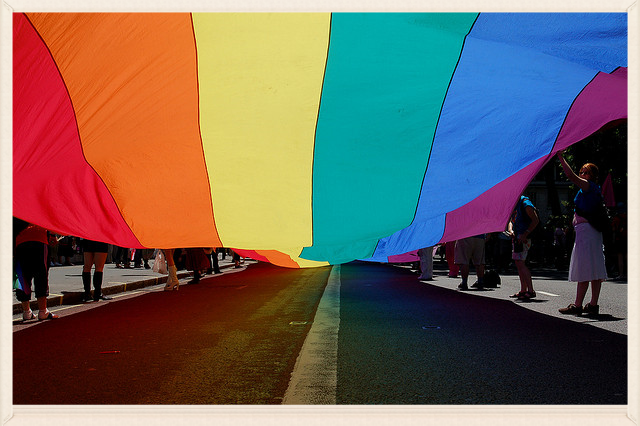"No!" to Second Class Citizenship
According to the Gospel of Luke, the original Last Supper — typically celebrated today as a meal of Christian unity — was scarcely finished before an argument broke out among the disciples about “which one of them was to be regarded as the greatest.” + Luke 22:24
We’ve been at it ever since.
Disagreement among Christians is as old as the faith itself, particularly on the topic of what it looks like to follow Jesus faithfully in a given time and place.
This diversity means that when it comes to “religious freedom” for Christians, the picture is complicated. One disciple’s experience of freedom is another’s experience of restraint.
Take the Syrian refugee crisis, for example. In one of the most famous passages in the New Testament, Jesus draws on ancient Jewish wisdom to proclaim that the truly righteous don’t only talk the talk of hospitality, but actually “welcome the stranger” (Matthew 25:35).
Some Hoosier Christians who take this seriously might well feel that their religious freedom is curbed or compromised to the extent that new refugees from Syria or elsewhere are not welcomed into Indiana. These Christians will sense a profound irony in debating the question during the season of Thanksgiving, a holiday in which, after all, we invoke the story of a group of (Christian) refugees fleeing persecution overseas and a group of Native American hosts who welcomed them. Other Hoosier Christians, of course, will see things differently.
How do we balance these competing perspectives? What counts as “religious freedom” — and what doesn’t? And how do we settle issues in which claims to religious freedom are on multiple sides of an issue?
In the Indiana legislature’s consideration of expanding the state’s civil rights protections to include sexual orientation and gender identity, whose religious freedom will have priority? The freedom of Christians and others who wish to live in a society in which it’s legal to deny, say, certain commercial services to lesbian, gay, bisexual and transgender people? Or the freedom of Christians and others who wish to live in a society in which LGBT people are legally protected from discrimination?
One general approach is to draw a distinction between (1) having a seat at the table of public life and (2) the disagreements that may take place in conversation around that table.
Any robust public life will include substantive, respectful debate, but we each get a seat at the table. Because of the fundamental dignity of each human being — a human dignity that runs deeper than our differences of race, sex, religion, and yes, sexual orientation and gender identity — no one should have second-class citizenship. This is one reason why we need civil rights protections: to help ensure that no Hoosier’s citizenship is second class.
From a Christian point of view, this fundamental dignity is God-given. It is part of what we mean when we say that every human being is created in God’s image (Genesis 1:27). But that ancient and beautiful idea has to do not only with my neighbor’s dignity, but also with mine. I am made in God’s image, too, and that means I am made to be just and generous and creative and brave. I am made to be dignified, even and especially in turbulent, difficult times.
As president of Christian Theological Seminary, I regularly interact with a wide range of Christian leaders and communities, from conservative to moderate to liberal. What’s been striking to me is that support for civil rights protections for LGBT people cuts across this theological spectrum. Even some of my brothers and sisters who theologically object to homosexuality nevertheless want to live in a society where no-one’s citizenship is second class — and they want this because of their commitment to Christian hospitality and justice, not in spite of it.
The truth is, we all need each other at the table. Like those earliest disciples, no doubt we will disagree from time to time. But where we can and must agree — remembering that rule called “golden” not because it’s easy, but because it’s precious — is to invite one another to the kind of seat at the table of public life we would choose to sit in ourselves.
A big SALT thank you to our very own Rev. Dr. Matthew Myer Boulton for this insightful Op Ed and for the Indianapolis Star for running it today!

